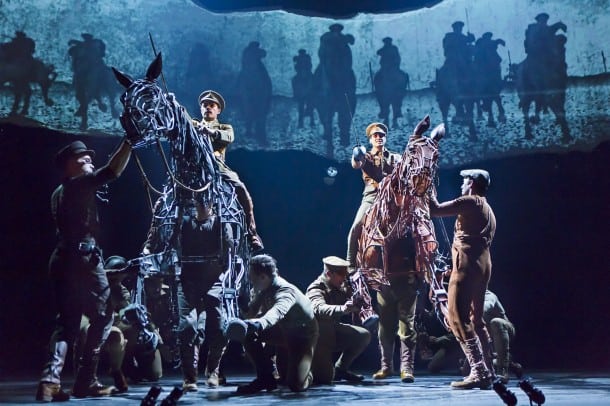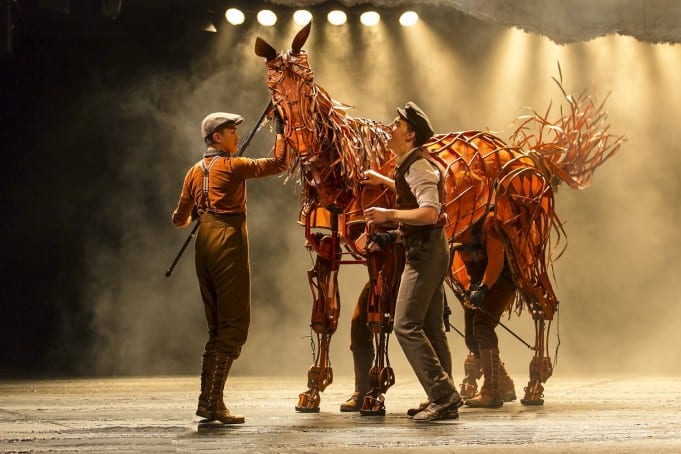The combination of Cavalia in San Jose and War Horse in San Francisco makes Summer 2012 horse season. Both explore the relationship between man and horse. Both command breathless attention. However, whereas Cavalia dazzles with its life force, the very first moments of War Horse raise the possibility that this could be a Shakespearean tragedy where none are left standing. This tension follows the entire show, holding you in its grasp.
Many writers focus almost exclusively on the magic worked by Handspring Puppet Company. Such focus is understandable, because the equine puppets – which puppeteer Basil Jones referred to as “a piece of emotional engineering to turn objects into verbs” – are so convincing that one rapidly forgets they’re not the real thing. However, this approach makes a tangential aspect of the show the central focus, and neglects to inform that these characters are more than the sum of their cane, wood and metal.
While based upon the novel by Michael Morpurgo, War Horse profoundly echoes Erich Maria Remarque’s “All Quiet on the Western Front.”
Alternatively, other critics focus on how predictable the show it. From the very first moments, you know the young protagonist will fall in love, and lose the object of his affections. The alcoholic Devon dad, over-worked mother, and good German Friedrich Muller are all straight from central casting. However, this approach fails as well. In trying to be smart, it makes all too obvious points, and fails to explore why this show won such critical acclaim – and why it’s the best touring show to hit San Francisco in some time.
While based upon the novel by Michael Morpurgo, War Horse profoundly echoes Erich Maria Remarque’s “All Quiet on the Western Front.” Remarque captured the majesty of the steeds that rode into battle, saying the “backs of the horses shine in the moonlight, their moves are beautiful, the toss their heads and their eyes gleam… it is strangely beautiful and arresting.” War Horse followed suit, bringing the noble thoroughbred Joey and his compatriot steed Topthorn leaping over barbed wire to the wild applause of the audience. Succeeding at every challenge, these animals command our respect. However, Remarque’s text quickly turns black as he writes:

“The cries continued. It is not men, they could not cry to horribly. ‘Wounded horses,’ says Kat. It’s unendurable. It is the moaning of the world, it is the martyred creation, wild with anguish, filled with terror, and groaning… The screaming of beasts becomes louder. One can no longer distinguish whence in this now quiet silvery landscape it comes; ghostly, invisible, it is everywhere, between heaven and earth is rolls on immeasurably. Deterring raves and yells out: ‘Shoot them! Shoot them, can’t you? Damn you again!”
War Horse brings you to the heart of both of these emotional extremes. While the show is smart enough to throw in bits of comedy, be it an insouciant toss of a tail, or fat, self-important geese waddling into stage center, you hope against hope for the unlikely happy ending, weighing the grimness of World War I, against the need for resolution. If the ending seems a little cheesy, it is the only counterbalance to that which preceded it. Because of this, audiences need not fear shelling out money for a vicarious trek through the no man’s land that gets stalled there.
War Horse is the one touring show that shouldn’t be missed.



